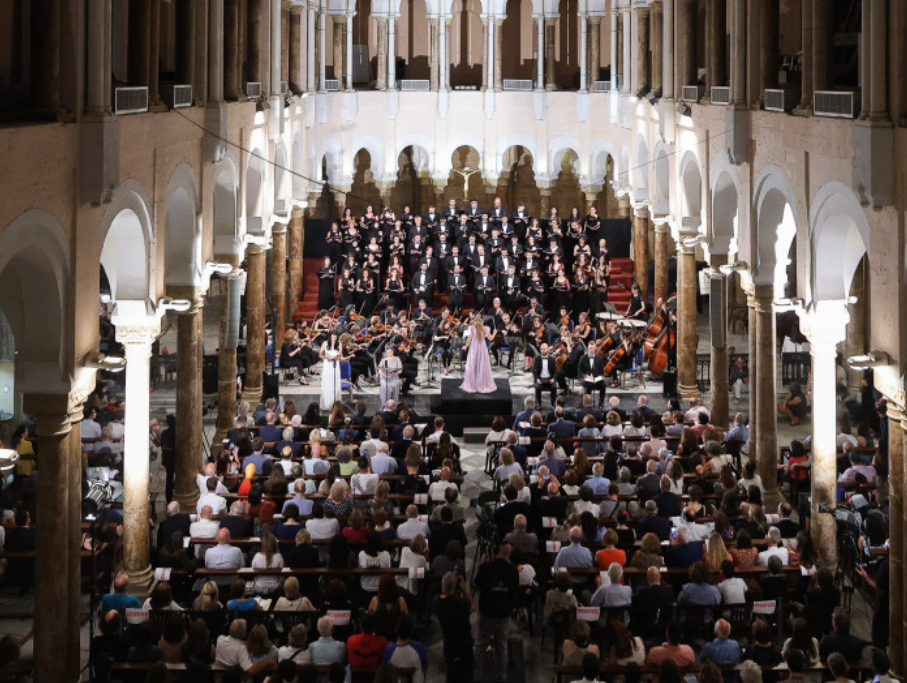The USJ Choir has been mesmerizing crowds in Lebanon with classical music performances since its founding in 2015. Today, with over 70 singers, and a growing line up of musicians, fascinating interpretations of a varied repertoire of classical music ranging from Baroque to contemporary compositions, are generously shared, raising Lebanese choral music to international heights.
Under the guiding vision of Yasmina Sabbah (YS), one of the few female choir and orchestra conductors in the MENA region, the USJ Choir has performed notable performances of Vaughan Williams’s “Dona Nobis Pacem”, Mozart’s “Requiem”, Handel’s “Messiah”, Haydn’s “Nelson Mass”, J.S. Bach’s “St. John Passion”, Jenkins’ “The Armed Man” along with many others.
We sat with Yasmina, to explore her love for classical music, why she chose to move back to Lebanon, the underlying messages behind every performance and the power of music on changing society.
Get your tickets for the upcoming ‘Broadway’ performance on May 20 and 21.
BDD: Firstly, thank you and the entire Choir, for sharing your love for classical music with Lebanon. After studying and working abroad, what led you to move back to Lebanon?
YS: I decided to come back to Lebanon for the Choir and the vision I have for the USJ Choir, in specific. The community we have created is like no other in terms of spirit, positivity, hard work, determination and musicianship. Musically, we are also performing several premieres and exploring very eclectic musical styles that have not been done before in Lebanon. Also, I feel we have so much to give in a country that truly loves art and is hungry for arts and music.
BDD: Did you face any challenges when you first started in 2016, until today?
YS: My experience has been challenging, but this is no surprise. I knew exactly what I was signing up for. It has been very hectic for me especially having to take care of all the production and management aspects of the concerts. Usually there are professional teams that take this on. However, I am very grateful to all the choir volunteers and committees that support me in this process and work very hard to make it happen. Also, we are facing many challenges in terms of funding and finding available local musicians, as our National Orchestra is falling apart. It can get very overwhelming, but it is worth it, because I believe in where we are going and what we are capable of giving. It is a long-term plan, and we are on the right path.
BDD: How do you continue to cultivate a classical music community, including both volunteers and listeners?
YS: Though Western Classical music is not part of our local music heritage, it has been very present in the Lebanese music scene. Our choir is very varied and has members who have graduated from the conservatory as violinists, pianists, clarinetists and classical singers. Others are studying or working full time jobs as doctors, lawyers, engineers, architects – and they come from all over the country, some driving every week from Batroun and Sour to attend rehearsals. Classical music grows on you and we all have something to learn from each other.
We are happy to keep exploring very varied music genres, and lately, lots of contemporary music, including a production of Disney and Broadway music that we will be doing at the Casino Du Liban on May 20-21, with favorites from Les Miserables, The Lion King, and many others. Some of our modern repertoire can defy our norms of tonality and what sounds “good to the ear”. It’s about getting to discover and appreciate new types of music… there is no better way than living the music to love it!
BDD: You mentioned challenges to sustain the Choir in terms of talent and funding. Can you elaborate more on that?
YS: As I shared, funding is our biggest challenge. The choir has been self-funded since the crisis in 2019, when all the university’s efforts are to provide scholarships for students to make education accessible to all.
Though the choir members themselves are volunteers, the costs and charges of concert production – including equipment rental, technicians, workers, physical plant, musicians, artists and more – are significant and have become increasingly difficult to bear due to inflation and incrementally constricting circumstances. The USJ Choir relies on funds from private philanthropists, corporate sponsors and organizations to continue offering concerts free of charge to the public.
Most sponsors or Associations fund big festivals, which makes it much more challenging for us as independents. Philanthropists are very highly solicited for medical and education emergencies. But music is not a luxury, and the funds are not going to “just a concert”, they are keeping an entire sector alive! All the funds we receive go directly towards:
- Producing top-caliber performances, free of charge to the public.
- Securing a sustainable future for decades to come by creating work opportunities for musicians, technicians and all the world of music production.
- Purchasing and renting necessary equipment.
- Nurturing young Lebanese talents and develop the musicians of the future through educational programs and masterclasses.
- Safeguarding the cultural and musical scene in Lebanon.
BDD: Can you share the tangible benefits of leading the Choir, and its impact on the volunteers?
YS: The most wonderful thing is that the singers are here by choice, because they love it. That changes everything. Loving something does not mean hard work, sacrifice and dedication. I cannot be more grateful to have choristers that give so much of their time to make the concert happen, and to support the team!
Some members find inner peace, joy and an escape from the challenges of daily life in the hard moments we are going through. Others, are here to explore new music and be part of high level music productions. Each member has their own unique story. What they have in common is love for music and love for the team.
BDD: We know the impact of classical music on the mind. What is the power and impact of classical music on society, given the dire circumstances that we are enduring?
YS: In these challenging times, our mission remains to keep music and culture alive despite any obstacles, as both are the cornerstones of Lebanese identity and spirit. While we are being deprived of many of our basic needs, and most of the local and international attention and aid are focused on mere survival, we cannot let the music, our lifeline, our source of joy and hope, be stripped away from us. Music is not a sheer luxury and keeping it alive matters because not only does it save our souls and sanity, but it also provides work opportunities to an entire sector that could be erased if not properly cared for.
BDD: On that note, what is your message to Lebanon through the Choir?
YS: I invite people to join our cultural resistance and help us keep alive one of the most fundamental pillars that make Lebanon the beautiful country we continue to dream of.
Catch the USJ Choir’s next performance, ‘Broadway’, on May20 and 21.




